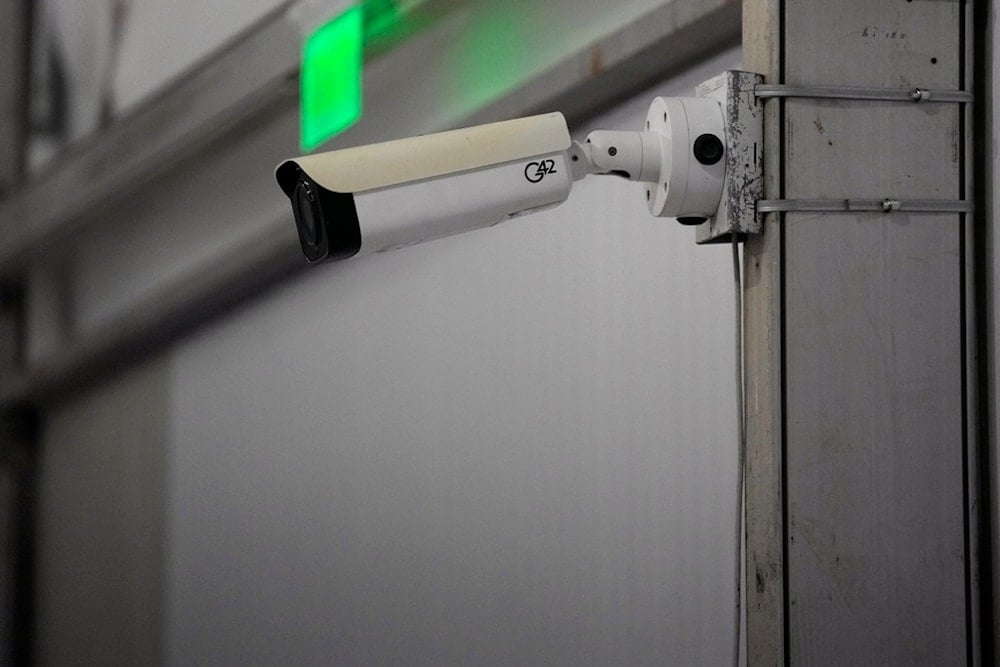Pro-Palestinian students in US may be surveilled off-campus: Axios
Experts highlight that US law enforcement agencies often rely on facial recognition and social media monitoring tools to investigate campus protests.
-

A G42 camera is visible at the COP28 U.N. Climate Summit, Friday, Dec. 8, 2023, in Dubai, United Arab Emirates. (AP/Rafiq Maqbool)
Experts warn that students taking part in ongoing pro-Palestinian protests in US universities may be subject to surveillance even off-campus, Axios reported.
The US-based news website highlighted that law enforcement agencies often rely on facial recognition and social media monitoring tools to investigate campus protests and arrest protesters. However, it noted that these technologies are prone to errors, leading to potential misidentification.
Over 2,000 people have been arrested on US university campuses in the past three weeks as they took part in the protests urging universities to divest from all investments linked to the Israeli occupation. Others were suspended, expelled, or put on probation.
Albert Fox Cahn, executive director of the Surveillance Technology Oversight Project (S.T.O.P.), noted the longstanding collaboration between police and universities on campus safety issues, often involving the sharing of campus video footage, protesters' geolocation data, and publicly available social media posts.
During the COVID-19 pandemic, university police departments acquired additional surveillance tools, citing concerns about campus safety, including potential shootings.
Some universities have installed automated license plate readers on campus, while others have discussed utilizing facial recognition databases from state law enforcement agencies for their investigations.
A 2022 news investigation revealed that at least 37 colleges have utilized Social Sentinel, a social media monitoring tool reportedly used to surveil student protesters since 2015.
Justin Sherman, a privacy researcher at Duke University, told Axios that "it's a lot easier to start using surveillance technologies than it is to stop using them."
"You can't 'control-Z' so easily on police starting to surveil students' social media accounts and campus activity on protests when there's not a lot of disclosure, there isn't a lot of accountability and there's very little incentive to stop doing it."
There are mounting concerns that students who participated in on-campus demonstrations may face heightened law enforcement surveillance even after graduation.
Sherman warned that "there's still an elevated risk that they could be subjected to more surveillance by the police because the police are tracking them now."
While Axios indicated that it remains unconfirmed whether Columbia University and other campuses employed facial recognition or other surveillance technologies to monitor pro-Palestinian protests, it recalled that students at Columbia have previously been targeted by both campus police and external law enforcement surveillance.
The news website emphasized that facial recognition tools are known to misidentify people of color due to their biased algorithms.
Sherman also underscored the historical tendency of law enforcement to disproportionately deploy surveillance technology against marginalized communities. But Cahn said that many protesters have become aware of the deployed surveillance technologies they confront.
During the 2020 Black Lives Matter protests, individuals discovered that masks worn for COVID-19 prevention could also hinder facial recognition, according to Axios. Similarly, participants in recent pro-Palestinian protests have worn face coverings to avoid being potentially identified.
Privacy activists suggest that demonstrators carry burner phones, switch internet-connected devices to Airplane mode, and disable biometric logins on these devices to protect their privacy, the news website concluded.
Read more: Johnson slams Biden's protest policy, calls for legal action on-campus

 3 Min Read
3 Min Read










